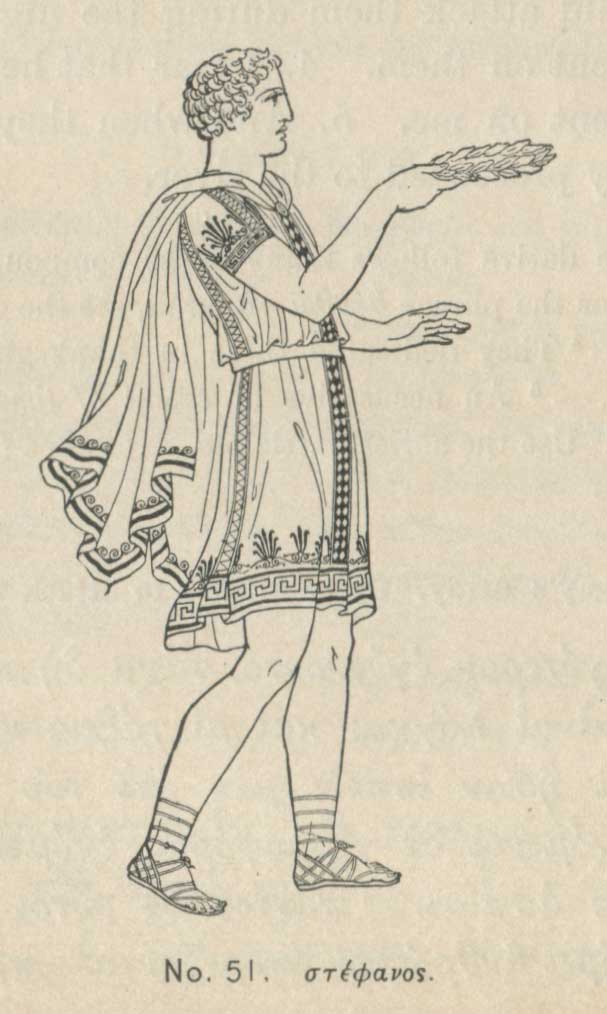THE FIRST GREEK BOOK
BY JOHN WILLIAMS WHITE, PH.D, LL.D., LITT.D.
Professor Of Ancient Greek At Harvard University
This Revision Copyright ©2012 by Shawn Irwin
Lesson LXXIV Regular Verbs in μι, τίθημι.
S689. Some verbs form the present and second aorist systems by adding the personal endings directly to the verb
stem, omitting the tense suffix ο/ε (135, 606), except in the subjunctive. In these verbs, therefore, the present
and second aorist stems are the simple verb stem, which is, however, often reduplicated with i in the present system.
S690. Compare the following forms of the present indicative active of
τί-θημι (θε), place, put, with those of λύω), loose:
|
|
Singular |
Plural |
Dual |
|||||||| |
Singular |
Plural |
Dual |
|
1. |
τί-θη-μι |
τι-ε-μεν |
--- |
|||||||| |
λύω |
λύο-μεν |
|
|
2. |
τί-θη-ς |
τί-θε-τε |
τί-θε-τον |
|||||||| |
λύεις |
λύε-τε |
λύε-τον |
|
3. |
τί-θη-σι |
τι-θέ-ᾱσι |
τί-θε-τον |
|||||||| |
λύει |
λύουσι |
λύε-τον |
S691. Such verbs are called Verbs in μι, because they retain the
personal ending μι in the first person singular of the present indicative active. Verbs like λύω are called Verbs in ω.
S692. Learn the conjugation of the present and second aorist systems of
τίθημι (θε), place, put, in 781 and 788.
S693. Review the endings and suffixes given in 136,145,175, 401, 413, 455, 484, 493,
Read and note the following in explanation of the paradigms:
S694.
1. In the singular of the present indicative active, and in the first person of the singular of the imperfect indicative
active, θε is lengthened to θη, and the third person plural of
the present ends in ᾱσι (for νσι).
2. In the imperfect indicative active, ἐτίθεις, ἐτίθει are formed as if from a contract verb τιθέω.
Compare ἐπροίεις, and ἐποίει (782). Similarly τίθει
in the present imperative active. Compare ποίει (782).
3. The subjunctive has the long vowel ω or η, as in verbs in
ω (315, 332), but this contracts with the final vowel of the verb stem (340).
4. The optative has the mood suffix (362, 379), ι or ιη, but the latter only
before active endings. the mood suffix is added directly to the verb stem and contracts with it. in these forms the accent cannot
pass beyond the mood suffix.
5. The singular of the second aorist indicative active does not occur. it is supplied by the first aorist forms ἔθηκα, ἔθηκας,
ἔθηκε, formed with the tense suffix κα for σα (148).
6. In the second aorist imperative active, θές is irregular, and the infinitive θεῖναι
(for θε-εναι) is formed with the ending εναι (for simple ναι).
7. The active participles τιθείς and θείς
are declined like λυθείς (754).
S695. VOCABULARY.
αἰχμάλωτος, ον, captured; as a noun, οἱ αιχμάλωτοι, prisoners of war, captives.
ἀνατίθημι, set up, dedicate.
αὐτοῦ, (compare αυτός), adverb, in the very place, here, there.
βακτηρια, ᾱς ἡ, staff, cane, walking stick.
γέρρον, ου, τό, wicker shield.
γόνυ, γόνατος τό, knee.
δέρμα, ατος τό, hide, skin.
διατίθημι, set out in order, arrange, dispose.
ἐντίθημι, put or place in, of fear, instill in, inspire in.
ἐπιτίθημι, impose on, inflict; middle, put oneself on, attack.
συντίθημι, put or place together; middle, contract, agree on, make an agreement.
τίθημι, (θε), θήσω, ἔθηκα, τέθεικα, τέθειμαι, ἐτέθην, put, set, place.
S696.
1. ἐπιθήσεται ἡμῖν.
2. τούτους δὲ ἐκέλευε θέσθαι τὰ ὅπλα περὶ τὴν αὑτοῦ σκηνήν.
3. τὴν δίκην χρῄζω ἐπιθεῖναι αυτῷ.
4. καὶ κελεύουσι φυλάττεσθαι μὴ ὑμῖν ἐπιθῶνται τῆς νυκτὸς οἱ βάρβαροι.
5. καὶ πάσᾱς τὰς οἱκίᾱs ἔκᾱεν, ἵνα φόβον ἐνθείη τοῖς ἄλλοις.
ἄλλοις The dative follows many verbs compounded with ἐν, σὺν, or ἐπὶ (865).
6. οὐκέτι ἐπετίθεντο οἱ πολέμιοι τοῖς Ἕλλησι, δεδοικότες μὴ ἀποτμηθείησαν.
7. τοὺς μὲν ὁπλίτᾶς αὐτοῦ ἐκέλευσε μεῖναι, τὰς ασπίδας πρὸς τὰ γόνατα θέντας.
αὐτοῦ, The adverb.
8. ἐνταῦθα ἀνετίθεσαν οἱ στρατιῶται δερμάτων πλῆθος καὶ βακτηρίᾱς καὶ τὰ αἰχμάλωτα γέρρα.
γέρρα, They dedicated these in thanksgiving for their safe arrival at the sea.
9. καὶ συντιθέμεθα τὴν νύκτα, ἢν λάβωμεν τὸ ἄκρον, τὸ χωρίον φυλάττειν.
νυκτα, An accusative of extent of time (836). Construe with φυλάττειν.
10. πάντας οὕτω διατιθεὶς ἀπεπέμπετο ὥστε αὐτῷ μᾶλλον φίλους εἶναι ἢ βασιλεῖ.
S697.
1. The hoplites grounded arms.
2. They feared that the Greeks would attack them during the night.
3. He will inflict punishment on them.
4. I fear that he may take and inflict punishment on me.
Use the aorist participle.
5. And when they had made this agreement, they proceeded to the river.
agreement ταῦτα (cognate accusative) συνθεμενοι.
S698. The Enemy’s Array. Cyrus wishes to attack the Persian Center.
ὅτε δὲ ἐγγύτερον ἐγίγνοντο, τάχα δὴ καὶ χαλκός τίς ἤστραπτε καὶ αἰ
λόγχαι καὶ αἰ τάξεις καταφανεῖς ἐγίγνοντο˙ καὶ ἦσαν ἱππεῖς μὲν ἐπὶ τοῦ
εὐωνύμου τῶν πολεμίων, ἐχόμενοι δὲ γερροφόροι, ἐχόμενοι δὲ ὁπλῖται
σὺν ξυλίναις ἀσπίσι. πάντες δὲ οὗτοι κατὰ ἔθνη ἐν πλαισίῳ πλήρει
ἀνρώπων ἐπορεύοντο. πρὸ δὲ αὐτῶν ἦν ἄρματα τὰ δρεπανηφόρα
καλούμενα. καὶ ἐν τούτῳ Κῦρος παρελαύνων αὐτὸς σὺν Πίγρητι τῷ
ἑρμηνεῖ καὶ ἄλλοις τρισὶν ἢ τέτταρσι τῷ Κλεάρχῳ ἐβόᾱ ἄγειν τό
στράτευμα κατὰ μέσον τὸ τῶν πολεμίων, ὅτι ἐκεῖ βασιλεὺς ἦν. "Κἂν τοῦτ᾽,"
ἔφη, "νικῶμεν, πάνθ᾽ ἡμῖν πεποίηται."
χαλκός τίς ἤστραπτε: here and there (τὶς) their bronze armor began to flash.
κατὰ ἔθνη: nation by nation.
ἐν πλαισιῳ πληρει ἀνθρωπων: in a solid square.
καλούμενα: so called.
κἄν: i.e. καν: καὶ ἐὰν.
πεποίηται: although a perfect in form, this refers vividly to the future, our whole work is
(will have been) done. compare 317.

See the route on the map.
End Of Chapter
INDEX
Chapter 75
HOME
This Revision Copyright ©2012 by Shawn Irwin
